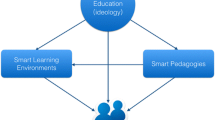Abstract
The rapid evolution of Information and Communication Technologies has led to new ways of learning and education. In Shanghai, researchers and developers of an online college actively seek technological interventions to provide first-class e-learning services for about 17,000 enrolled students. They developed a cutting-edge pervasive learning platform that provide “always on” education. It aims to support “Learning Anytime, Anywhere”, which is accomplished through extending the real classrooms and also supporting web-based self-paced learning. The platform is composed of three components: a) distributed Standard Natural Classrooms, the smart spaces to provide natural interaction for teachers and students; b) large-scale media streaming for multi-mode terminals delivering fully interactive lectures to PCs and mobile devices; c) dynamic and personalized web-based learning systems. Multi-modal interactions are supported that students learning on this platform change from passive learners to truly engaged learners who are behaviorally, intellectually, and emotionally involved in their learning activities.
Access this chapter
Tax calculation will be finalised at checkout
Purchases are for personal use only
Preview
Unable to display preview. Download preview PDF.
Similar content being viewed by others
References
Alexander, B.: Web 2.0: A new wave of innovation for teaching and learning. EDUCAUSE Review 41(2), 32–44 (2006)
Blackboard Company, http://www.blackboard.com
Groeneboer, C., Stockley, D., Calvert, T.: Virtual-U: A collaborative model for online learning environments. In: Proceedings of the Second International Conference on Computer Support for Collaborative Learning, Toronto, Ontario, pp. 122–130 (1997)
Isen, A.M.: Positive affect and decision making. In: Lewis, M., Haviland, J. (eds.) Handbook of emotions, p. 720. The Guilford Press, Guilford, New York (2000)
Kim, W.: Towards a Definition and Methodology for Blended Learning. In: International Workshop on Blended Learning 2007 (WBL 2007), pp. 15–17. University of Edinburgh, Scotland (2007)
Network Education College, Shanghai Jiao Tong University, http://www.nec.sjtu.edu.cn
UK Open University, http://www.open.ac.uk
Hong Kong Open University, http://www.ouhk.edu.hk
Picard, R.W., Papert, S., Bender, W., Blumberg, B., Breazeal, C., Cavallo, D., et al.: Affective learning — a manifesto. BT Technology Journal 22(4), 253–269 (2004)
Shen, L.P., Shen, R.M.: Ontology-based intelligent learning content recommendation service. International Journal of Continuing Engineering Education and Life-Long Learning 15(3-6), 308–317 (2005)
Shen, L.P., Callaghan, V., Shen, R.M.: Affective e-Learning in Residential and Pervasive Computing Environments. Journal of Information Systems Frontiers (special issue on Adoption and Use of Information & Communication Technologies in the Residential/Household Context) 10(3) (October 2008)
Shi, Y.C., Xie, W.K., Xu, G.Y., et al.: The Smart Classroom: Merging Technologies for Seamless Tele-Education. IEEE Pervasive Computing, 1536-1268/03, 47–55 (2003)
Thomas, S.: Pervasive Scale: A model of pervasive, ubiquitous, and ambient learning. IEEE Pervasive Computing 7(1), 85–88 (2008)
Ullrich, C.: Course generation based on HTN planning. In: Proceedings of 13th Annual Workshop of the SIG Adaptivity and User Modeling in Interactive Systems, pp. 74–79 (2005)
Shen, R.M., Li, X.J.: A web automatic answer system based on WWW. Computer Engineering 25(09), 49–51 (1999)
Wang, M.J., Shen, R.M., Novak, D., Pan, X.Y.: The Impact of Mobile Learning on Learning Behaviors and Performance: Report from a Large Blended Classroom. British Journal of Educational Technology 38(2), 294–311 (2007)
WebCT Company, http://www.webct.com
Yang, F., Han, P., Shen, R.M., Kraemer, B.J., Fan, X.W.: Cooperative Learning in Self-organizing E-Learner Communities Based on a Multi-Agents Mechanism. In: Gedeon, T.D., Fung, L.C.C. (eds.) AI 2003. LNCS (LNAI), vol. 2903, pp. 490–500. Springer, Heidelberg (2003)
Author information
Authors and Affiliations
Editor information
Rights and permissions
Copyright information
© 2008 Springer-Verlag Berlin Heidelberg
About this paper
Cite this paper
Shen, L., Shen, R. (2008). The Pervasive Learning Platform of a Shanghai Online College – A Large-Scale Test-Bed for Hybrid Learning. In: Fong, J., Kwan, R., Wang, F.L. (eds) Hybrid Learning and Education. ICHL 2008. Lecture Notes in Computer Science, vol 5169. Springer, Berlin, Heidelberg. https://doi.org/10.1007/978-3-540-85170-7_16
Download citation
DOI: https://doi.org/10.1007/978-3-540-85170-7_16
Publisher Name: Springer, Berlin, Heidelberg
Print ISBN: 978-3-540-85169-1
Online ISBN: 978-3-540-85170-7
eBook Packages: Computer ScienceComputer Science (R0)




